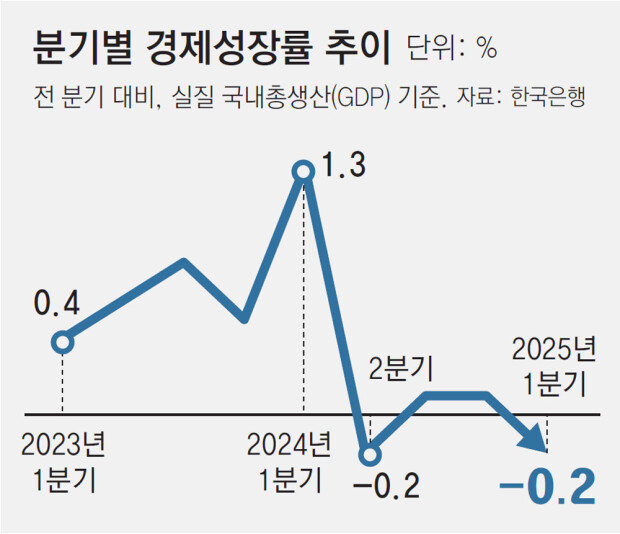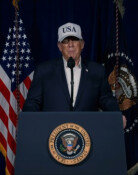South Korea’s economy shrinks 0.2% in Q1
South Korea’s economy shrinks 0.2% in Q1
Posted April. 25, 2025 07:21,
Updated April. 25, 2025 07:21

South Korea’s economy contracted in the first quarter of 2025, falling behind the previous quarter and continuing a trend of stagnant growth. This marked the fourth consecutive quarter with growth at or below 0.1 percent, a pattern unseen even during the Asian financial crisis.
According to data released by the Bank of Korea on April 24, real gross domestic product (GDP) shrank by 0.2 percent from the previous quarter. This figure is 0.4 percentage points below the central bank’s February forecast of 0.2 percent growth.
As a result, quarterly GDP growth turned negative again for the first time in three quarters since a contraction in the second quarter of last year (–0.2 percent). Growth in the third and fourth quarters of 2024 remained at just 0.1 percent each, marking four consecutive quarters of growth at or below 0.1 percent and signaling a pattern of economic stagnation. This was due to negative growth across investment, consumption, and exports.
By sector, construction investment dropped 3.2 percent, hit hard by the sluggish housing market. Facility investment also fell 2.1 percent, particularly in semiconductor manufacturing equipment. Private consumption in the entertainment, healthcare, and culture sectors declined by 0.1 percent, and exports shrank by 1.1 percent. Analysts pointed to a combination of weak domestic demand, political uncertainty, and fears of new U.S. tariffs as key contributing factors.
While in Washington, Bank of Korea Governor Rhee Chang-yong told CNBC on April 23 that “political instability has dampened consumer and investor sentiment,” adding that it remains to be seen how economic sentiment, spending, and investment will recover following the presidential election. However, experts warn that the second quarter’s growth may also fall short of the current 0.8 percent projection, especially as the full impact of U.S. trade policy starts to weigh on key indicators.
Criticism has mounted over the government’s perceived lack of urgency in addressing the downturn. Woo Suk-jin, an economics professor at Myongji University, said, “Concerns about an economic slowdown have been raised since last year, but the government failed to respond promptly. If an early supplementary budget had been implemented, the quarterly GDP would not have turned negative.”
강우석기자 wskang@donga.com



![[단독]폴란드, 韓 해군 최초 잠수함 ‘장보고함’ 무상 양도 안받기로](https://dimg.donga.com/c/138/175/90/1/wps/NEWS/IMAGE/2026/02/27/133437397.1.jpg)


![“‘표심’ 따라 이란 친 트럼프…지독하게 변덕스럽지만 치밀해” [트럼피디아] 〈60〉](https://dimg.donga.com/c/138/175/90/1/wps/NEWS/IMAGE/2026/03/01/133441726.1.jpg)
